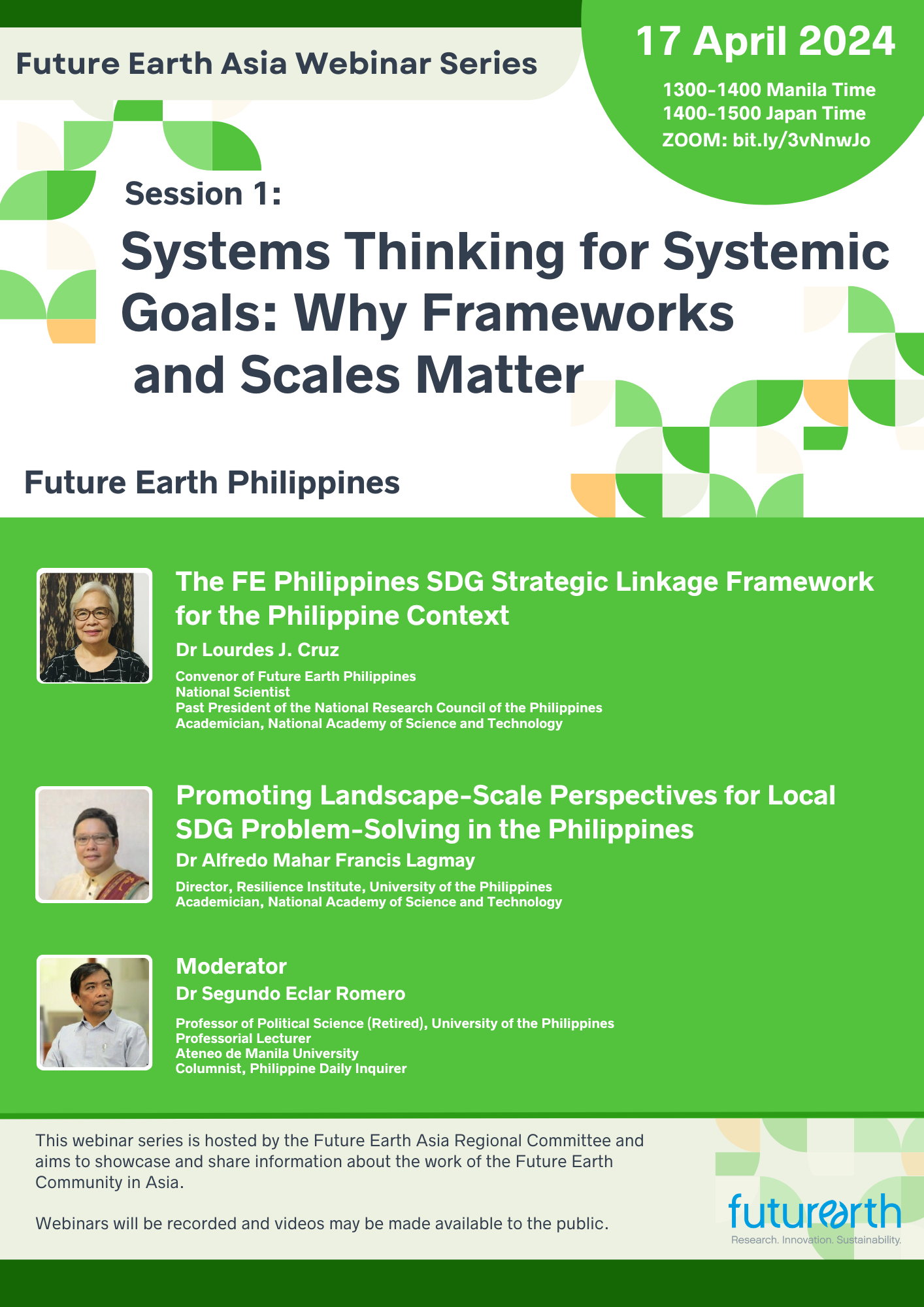Advancing Sustainable Development in Asia: Insights from the First Future Earth Asia Regional Committee Webinar on Systems Thinking
The Future Earth Asia Regional Committee has launched a webinar series to showcase and share insights into the work of the various Future Earth communities in the Asia-Pacific region. The first session of the series was held on April 17, with the Future Earth Philippines presenting on “Systems Thinking for Systems Goals: Why Frameworks and Scales Matter?” The webinar attracted more than 30 participants from across the Asia-Pacific region.
The webinar featured two distinguished speakers with moderator, Dr Segundo Eclar Romero, Professor of Political Science (Retired), University of the Philippines, Professorial Lecturer, Ateneo de Manila University, Columnist, Philippine Daily Inquirer.
Dr. Lourdes Cruz, Convenor of Future Earth Philippines, National Scientist, Past President of the National Research Council of the Philippines and Academician, National Academy of Science and Technology, presented on the Future Earth Philippines SDG Strategic Linkage Framework. She outlined the history and objectives of Future Earth Philippines, established in 2017 to address urgent ecological issues, focusing on sustainability, resilience, and inclusive development. Dr. Cruz emphasized the interrelation of the 17 Sustainable Development Goals (SDGs), categorizing them into guiding principles, aspirations, and interventions. She highlighted quality education (SDG 4) as foundational for achieving other SDGs and noted significant challenges such as the ecological deficit and the need for effective intervention strategies.
Dr. Alfredo Mahar Francis Lagmay, Director, Resilience Institute, University of the Philippines, Academician and National Academy of Science and Technology, discussed landscape scale perspectives for local SDG problem-solving. He underscored the importance of linking people and places for a holistic understanding of landscapes and advocated for ecosystem-based adaptation strategies to address climate change. Dr. Lagmay emphasized the need for science-based and risk-informed planning at local levels, involving various sectors like agriculture, water, and health in crafting resilient plans. He highlighted the University of the Philippines’ role in aiding local government units (LGUs) with their development plans and mentioned the availability of significant funding (35 billion pesos annually) for disaster risk reduction and management. He stressed the importance of local research and capacity building to support sustainable development.
Following the presentations by the speakers, the panel session focused on addressing specific questions from the audience related to the application and outcomes of SDGs frameworks in various cities. Dr. Cruz detailed the process in Pampanga, involving workshops and consultations with various stakeholders to create a comprehensive problem tree and strategic pathways. Dr. Segundo emphasized the importance of systems thinking and stakeholder unity. Dr. Lagmay highlighted the impact of science-based, risk-informed plans on reducing disaster-related fatalities and the need for better planning to protect infrastructure and agriculture. The discussion underscored the critical role of inclusive and science-based approaches in achieving the SDGs and enhancing community resilience.
The webinar demonstrated the spirit of knowledge sharing and collaboration within the Future Earth Asia community, aiming to further the goal of sustainable development in the region. It concluded with a call for continued collaboration and engagement within the Future Earth community in Asia and beyond. Upcoming webinar lineups include national committees in Thailand, Korea, and Australia, with interest from other regional and national organizations to collaborate.
DATE
June 18, 2024AUTHOR
Masami OkaRieko Yamamoto
SHARE WITH YOUR NETWORK
RELATED POSTS
International Expert Report for Forward-Looking Climate and Biodiversity Research Launched in Finland
Exploring the “10 Must Knows from Biodiversity Science 2024”
Future Earth Experts Contribute to “10 Must Knows” as a Guide to Preserving Biodiversity
